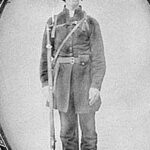Understanding the Confederate uniform during the Civil War, particularly in regions like New Mexico, requires moving beyond the romanticized image of soldiers clad in neat rows of gray or butternut. The reality, especially for the Army of New Mexico, was far more diverse and pragmatic, shaped by supply shortages and battlefield necessity.
 Historical Re-Enactors
Historical Re-Enactors
In the Confederate Army of New Mexico, enlisted men rarely, if ever, sported standard Confederate uniforms. The iconic gray or butternut uniforms were primarily reserved for officers. Instead, Confederate soldiers in this theater of the war often found themselves wearing a patchwork of clothing, frequently including captured Union army attire acquired in Texas and New Mexico. The practicality of utilizing captured Federal uniforms became a defining characteristic of the Confederate soldier’s appearance in this region.
A Closer Look at the Confederate Soldier’s Ensemble
To accurately depict a Confederate soldier from the Army of New Mexico, consider the following elements that comprised their non-standard “uniform”:
Hats: Headwear was a diverse mix, reflecting both military surplus and civilian adaptations:
- Broad brimmed felt or straw Union forage caps: Captured Union caps were common and practical in the Southwestern climate.
- Wheel caps: Another style of military cap, potentially from various sources.
- Hardee hats: Though more formally military, these could have been acquired through capture or supply routes.
- Period civilian hats: Civilian hats of felt or straw were frequently used, emphasizing the non-regulation nature of their dress.
 Confederate Soldier
Confederate Soldier
 Confederate Solider
Confederate Solider
Coats & Jackets: Outerwear options were dictated by availability and resourcefulness:
- Captured Federal sack coats or shell jackets: These were exceptionally common, providing readily available and functional garments.
- Mexican War surplus clothing: Older military surplus from the Mexican-American War might have been utilized, reflecting the limited resources.
- Civilian sack or frock coats: Civilian coats were a staple, highlighting the blend of military and civilian clothing.
Shirts: Underneath their coats, shirts were often civilian in origin or repurposed:
- Civilian Shirts: Made from cotton, wool, muslin, or other period-appropriate materials, reflecting the reliance on civilian supply chains.
- “Battle” overshirt: A more rugged, utilitarian style of shirt suitable for field conditions.
- Federal issue shirts: Captured Union shirts would also have been worn.
Trousers: Legwear followed a similar pattern of mixed origins:
- Civilian Pattern Trousers: Made from wool, corduroy, cotton duck, or jeans cloth (wool-cotton blend), showcasing the use of durable civilian fabrics.
- Federal issue trousers: Captured Federal trousers were a practical and common choice.
- Mexican style vaquero trousers: Reflecting the Southwestern context, trousers in the style of Mexican vaqueros might have been worn.
Footwear: Foot protection ranged from military to civilian styles:
- Military brogans or boots: Standard military footwear when available.
- Civilian shoes or boots: Civilian footwear filled the gaps in military supply.
Accoutrements: Equipment was often scavenged or repurposed:
- Captured Federal equipment: Cartridge boxes, canteens, haversacks, belts, cap pouches, and bayonets taken from Union soldiers.
- Belt knife: A personal weapon and tool.
- Mexican War surplus equipment: Older military gear.
- Civilian / homemade equipment: Soldiers and local suppliers crafted or adapted equipment as needed.
 Confederate Soldier
Confederate Soldier
Federal Uniforms: Standardization in Contrast
In stark contrast to their Confederate counterparts in New Mexico, Federal troops, including California, Colorado, and New Mexico Volunteers, generally wore standard Federal issue uniforms. The Union army benefited from established supply lines and existing inventories, leading to greater uniformity and less reliance on improvised clothing. While variations existed, the Federal soldier’s appearance was significantly more standardized than that of the Confederate soldier in the Southwest.
 Federal Soldier
Federal Soldier
Conclusion: The Pragmatic Uniform of the Confederate West
The Confederate uniform in the Civil War’s New Mexico theater was a testament to necessity and adaptation. Far from the idealized image of uniform gray, the Confederate soldier often presented a diverse, practical, and resourceful appearance. Understanding this reality is crucial for historical accuracy, particularly for reenactors aiming to authentically portray the soldiers who fought in the Western reaches of the Confederacy. The blend of civilian garments, captured enemy supplies, and limited Confederate issue clothing defines the true look of the Confederate Army of New Mexico.

